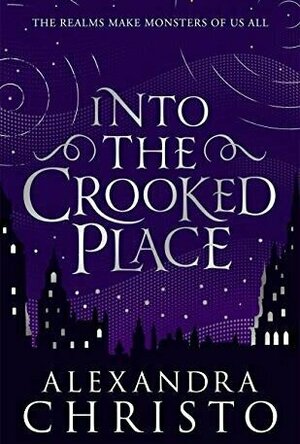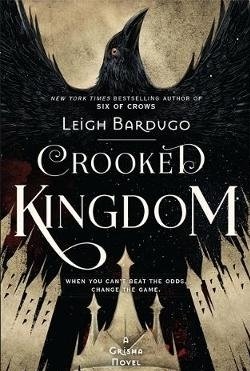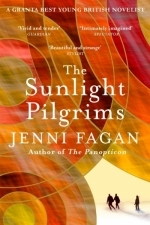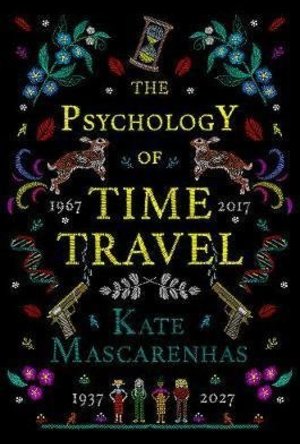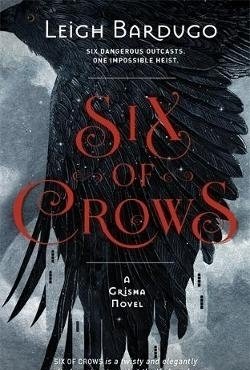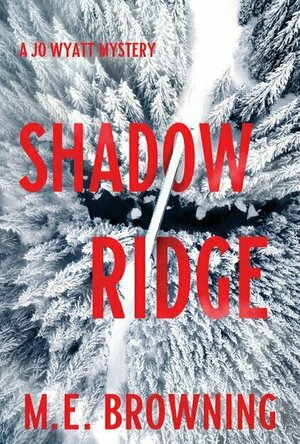
Shadow Ridge (Jo Wyatt Mystery #1)
Book
Death is one click away when a string of murders rocks a small Colorado town in the first...
Mystery Crime Police Procedural
James Koppert (2698 KP) rated Into The Crooked Place (Into The Crooked Place #1) in Books
Nov 13, 2019
The setting, the characters and the basic plot really does work. This is a book about organised crime in a post war world full of different races of people, some of whom who craft magic who have been all but wiped out, warriors who protected them and ordinary people all of whom sit underneath the organised crime of the kingpin and his underbosses. The story focuses on the underboss Wesley and his crew of strong female characters, the warrior Karam, the secret crafter Saxony and Tavia the busker who sells the boss' magic and all of whom are pretty good in a scrap.
The characters are well created and you can visualise them easily on the pages. The adventure they go on has you rooting for them and the world is an exciting one that does hold enormous potential to be lost in. It is all however a little too dragged out.
As you can see this is the first in the series and the book very much does just tell the first part of the adventure, which is full of magic, betrayal, violence and even some glimmers of romance and yes, it does get very exciting and page turning in some parts, but considering this is only part of the story it could have done with being 150 pages shorter than it was. It just all seemed far more drawn out than it needed to be and let it down slightly. Because of this I was pleased to reach the end instead of being excited to pick up the next part which is a shame because Christo has created characters and a world which deserve to be explored and travelled in. Lets hope Into the Crooked Place number 2 allows this to become the cake it should be.
postapocalypticplayground (27 KP) rated Crooked Kingdom in Books
Jan 9, 2018
Crooked Kingdom is a longer book than Six of Crows yet the action takes place mainly over a matter of days, the multiple POV's stretching the tortuously epic and heart thumping twists across the pages. It still has that immense page turning captivation that was within Six of Crows, but it just lacked that extra sense of excitement along with it. They are both books of equal joy but I think book 1 just pips it, but only just. In typical Kaz Brekker style there are twists and swindles and multiple cons that would given Danny Ocean on his best day a run for his money. I love a story that keeps me questioning myself and hanging on a thread as to the outcome, and Crooked Kingdom gave this to me in spades.
I don't know what is wrong with me of late in the emotions stake, but this book again reduced me to tears, the short but intense bursts of connectivity with the characters overwhelmed me. Multiple POV's in books is a risk and I have been drowned by them in books in the past but Leigh Bardugo manages to completely avoid this. Despite every player being forced to battle for chapter time, I felt utterly part of them and their story, sharing their joys and sadness as they peaked and troughed through the words.
The only thing that I didn't enjoy about this concluding part of the duology was entirely down to the publisher. I read the paperback of this book and found that the text was just so hard to read. The margins were so tight, the text was disappearing into the gutter and hiding under my thumbs as I was reading. I hate having to bend back spines on paperbacks which made this even more of an arduous task, I get that more text on a page means fewer pages and lower print costs but this made it such a hard read at times, sort it out Indigo!! This is the first Duology that I have read and I have to say this is now my favourite book series style, all of the action and none of the filler - I hope that more writers/publishers take this forward in the future.
Would I love more from Kaz and the Dregs? Of course! However, unlike a TV show that jumps the shark I am glad that the world of Ketterdam has been left the way it has and I look forward immensely to the next original world created by Bardugo.

San Andreas Grand Crime City 3D - Drift, Race & Shoot in Real Gangster City Simulator
Games and Entertainment
App
Welcome to the criminal world of Miami Vice City and take up the charge of the Miami Vice Grand...
Shadows Across the Moon: Outlaws, Freaks, Shamans and the Making of Ibiza Clubland
Helen Donlon and Richie Hawtin
Book
Once a fabled pirate garrison, the Balearic island of Ibiza has been colonised and continually...

Gangster Rio City: Crime Simulator 3D Full
Games
App
The rivalry between criminals and police takes a new twist! Build your own crime business in Rio!...
Eilidh G Clark (177 KP) rated The Sunlight Pilgrims in Books
May 13, 2017
Jenni Fagan’s The Sunlight Pilgrims was published by Windmill Books in 2015 and for me, was a much-anticipated novel. After reading her debut novel, The Panopticon, my expectations were high and I was not disappointed. This is a pre-apocalyptic novel set in a fictional Scottish town of Clachan Fells in the not too distant future of 2020. The novel explores the lives of a community of eccentric individuals living in close the proximity of a caravan park. As the temperatures plunge into extreme minuses, the residents are faced with a bleak and uncertain future, not only of their own survival, but also the survival of the human race.
The most interesting thing about this novel is that on the surface, nothing really happens, yet it would be wise to look deeper. Amongst the daily challenges of individual lives, there lurks a thought provoking tale of identity, community, and environment.
The novel is written from the perspective of two of its main characters Stella – a transgender teenager and Dylan a Londoner who recently moves to Clachan Fells. The most interesting thing about these two characters is the perspectives that each individual has about place. For Stella, her world is a difficult place full of prejudice and rejection, even from her own father. Whilst her own personal identity is unquestionable, the community rejects her choices. This point of view provokes the reader to question the nature of identity, a topic often argued when discussing Scotland. From Stella’s point of view, her own identity is progressive, changing, developing while the society around her static. Alistair’s point of view however, allows the reader a modern and open approach. Described in the prologue as the Incomer (notice the capitalization) directs the reader towards Margaret Elphinstone’s novel The Incomer published in 1987. Elphinstone’s novel is a post-apocalyptic tale and, like Fagan’s, novel examines the question of identity. Thomas Christie suggests in Notional Identities, that Elphinstone is ‘depicting the country’s ability to adapt to extreme change¬ ̶ carving a form of localism from the bones of globalisation ̶ she recognises its progressive aptitude to embrace forces of social transformation while retaining recognisable core cultural imperatives.’ It is no coincidence that Fagan has subtly steered the reader to this novel; identity is clearly a topic that the author is keen to explore. Dylan is a progressive character in Fagan’s novel. Discovering Stella identity very early in the novel, the character never questions her choices or that of Mother who has two partners. Likewise, this progressive thinking expands to the other residents of the caravan park, which houses a prostitute, an alien worshipper, and a disabled man with a crooked back who worships the sky. Not only does Dylan accept people for who they are; his deep connection to the environment makes him instinctive as opposed to the more rational thinkers of the world.
Unlike many modern writers, Fagan raises more questions about society and identity than she answers. This is an interesting technique as it leaves the reader to question the novel as opposed to question to authors own political and societal views. That said there is no doubt that this is a Scottish novel. The story is steeped in Scottish mythical symbolism such as the blackbird that lands on a fence post with his eyes reflecting a vast mountain range, to the eagles and stag’s on the mountains. In addition, the characters take on mythical persona’s including a giant, a girl with second sight, and a moon polisher. With oral tales of Sunlight Pilgrims highlighting the Scottish oral storytelling tradition, and a poetic sentence structure done in true Fagan style this novel feels truly Scottish.
I would highly recommend this postmodern novel, which urges the reader to look beyond society and address the problems of ego and the rational mind in order to create a progressive unified world where outsiders are welcomed as incomers – a prevalent issue in today’s society.
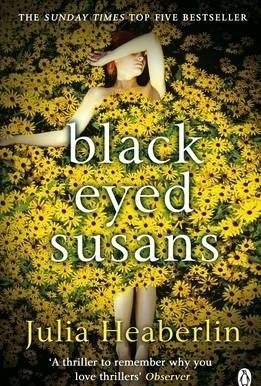
Black-Eyed Susans
Book
**THE TOP 5 SUNDAY TIMES BESTSELLER** 'My book of the year so far. Breathtakingly, heart-stoppingly...
Ivana A. | Diary of Difference (1171 KP) rated The Psychology of Time Travel in Books
Dec 30, 2018
I love the idea of time travelling and I love the idea of time travelling books. That is the main reason why I chose to read this ARC copy. The synopsis sounded intriguing, and the cover was gorgeous. I don’t have much experience reading time travelling books. I still believe the synopsis is intriguing and the cover is gorgeous, but I am not satisfied with the feelings this book left me, after I read the last chapter.
The story begins when four ladies in the early 1960s work together and build the first time travel machine. And they are surrounded by curious people and media, and one of them has a breakdown and is expelled from the project, as she is a risk to herself and others. But they don’t just exclude her from their project, but from their whole lives, and time travelling altogether.
”Sometimes we want proximity and a crowd gives us the excuse.”
And many years after, when time travelling is something everyone knows about, secrets start to be revealed, little by little, and a murder happens without explanation. A few young women, completely unrelated and with different missions will try to get their way into the whole time-travel business, and try to figure the answers to their questions.
In The Psychology of Time Travel, one is certain – you will flow through time and places like never before. One chapter it’s 1967, and the next one, it’s 2015. You will meet a lady and her young self, her old self, and her current self, all at one place, talking to each other, or simultaneously performing a dancing act. You will get to see a world very well created, a complex structure of how time travel might work, and details that you wouldn’t thought of checking twice.
I couldn’t connect to any character. Maybe there were too many. The chapters were very short, and they travelled through years so quickly, that I couldn’t catch up. Catching up with the plot of a book, and figuring out what is going on while being presented things so fast is very frustrating. It’s like watching a movie in a foreign language, the subtitles being your only way of gathering information, and they disappear instantly, without you having a chance to understand.
The romance in this book was another thing that bothered me. While we get a lot of romantic relationships going around, one particularly threw me off my feet. A love story where one girl is in love with another. This is the completely realistic part. But the unrealistic one was that one girl lives in the present, and the other is a time-traveller in the past – so even though they are currently (technically) the same age, in reality one is in the mid 20s, and the other in the mid 80s. I couldn’t process this, or agree with it.
”You couldn’t get involved with someone who spent most of their life in a different time period from you.”
I am sure I would have loved the characters, have I had more chances to get to know them. They showed signs of bravery, and goals and hopes for a better tomorrow, with a spark unlike any others. But it all lasted so short, before we switched to another character, and so on.
Even though this one didn’t work for me – I still encourage you to give it a go, if you are a fan of time travel. The idea of time travelling is very well done, and deserves to be discussed.
A huge thank you to NetGalley and Crooked Lane Books, for providing me an ARC copy of The Psychology of Time Travel in exchange for an honest review.
Sophia (Bookwyrming Thoughts) (530 KP) rated Six of Crows in Books
Jan 23, 2020
<div class="separator" style="clear: both; text-align: center;"><a style="margin-left: 1em; margin-right: 1em;" href="https://1.bp.blogspot.com/-hcqoJiAtqoU/WP49XaJ2bwI/AAAAAAAAHOA/OnF5g0zvczILdnf3D8tiOTTTG2Uhr1_7gCLcB/s1600/hiding-gif.gif"><img src="http://bookwyrmingthoughts.bookblog.io/wp-content/uploads/sites/317/2017/05/hiding-gif.gif"; width="320" height="168" border="0" /></a></div>
I’ve finally read <em>Six of Crows,</em> the book that everyone keeps talking about and won’t stop talking about (now everyone keeps talking about <i>Crooked Kingdom</i>, among other books), and <i>hellooo </i>this is better than the <i>Grisha </i>trilogy. I didn’t even like Alina or Mal from the first series - if anything, I liked the Darkling (bless his dark heart) and Stormhound (I keep wondering if he’ll appear and he doesn’t seem to have despite the fact there might be mentions of him 🤔).
Yet with <i>Six of Crows</i>… I like maybe 85% of the main characters. I say maybe because my math might actually be off and I’m too lazy to actually pull out a calculator and punch in some numbers to get what might be 0.84999. And it’s 85% because I might hate them later. That’s more than who I liked from the <i>Grisha </i>trilogy. 😱
<i>Six of Crows</i> technically has six main characters: Kaz, Inej, Nina, Matthias, Jesper, and Wylan (the odd little bean with no spotlight and therefore no prowling in his mind). All of whom are outcasts sent on a suicidal mission to rescue the creator of a drug that increases a Grisha’s power exponentially yet kills them in the end.
Five of which all have POVs switching around every chapter. I’m not a <i>huge </i>fan of multiple POVs because it can easily get confusing, but Bardugo wrote all five in a way that I’m not confused and running around like a little hamster who lost hold of how to stop its wheel.
The group of six are <i>fantastic </i>as a group - despite their differences, they get along pretty well and have a great dynamic together. They’re even better as pairs: Kaz and Inej, Nina and Matthias, Jesper and Wylan. I am all for witty and snark and just great dialogue. 😍
<blockquote class="tr_bq">Jesper knocked his head against the hull and cast his eyes heavenward. “Fine. But if Pekka Rollins kills us all, I’m going to get Wylan’s ghost to teach my ghost how to play the flute just so that I can annoy the hell out of your ghost.”
Brekker’s lips quirked. “I’ll just hire Matthias’ ghost to kick your ghost’s ass.”
“My ghost won’t associate with your ghost,” Matthias said primly.</blockquote>
In case anyone wonders…. I ship Kaz and Inej. They are, simply out, badass and go well together perfectly (apparently my ship doesn’t sail in the sequel, which I’m extremely disappointed about). Kaz is a brilliant leader leading the Dregs with all kinds of tricks and plans up his cane and never backs down from a mission no matter how impossible it may be. Inej is a highly skilled assassin who has a knack for sneaking up on people without them ever knowing. Have I mentioned under their tough exteriors, they’re occasionally softies and it’s cute?
Onto ze world… <i>Six of Crows</i> brings us back to the world of Grisha, onto a small little island off the coast of Ravka and Shu Han, and into a little area called Ketterdam where criminals and misfits of society lurk together. I really loved the drastic change from palaces to a complete polar opposite where one has to constantly watch their back. Throughout the duration of the book, I really liked Bardugo’s descriptions of each place the six travel on their way, especially with how Fjerda has this ice court with a palace virtually impossible to break into with all the top notch security that they have.
<i>Six of Crows</i> can be read regardless of whether or not the <i>Grisha </i>trilogy has been read - there’s excellent character dynamics, great dialogue that might cause a laugh or two, and a cast that come from all kinds of backgrounds.
<a href="https://bookwyrmingthoughts.com/six-of-crows-by-leigh-bardugo-review/"; target="_blank">This review was originally posted on Bookwyrming Thoughts</a>
